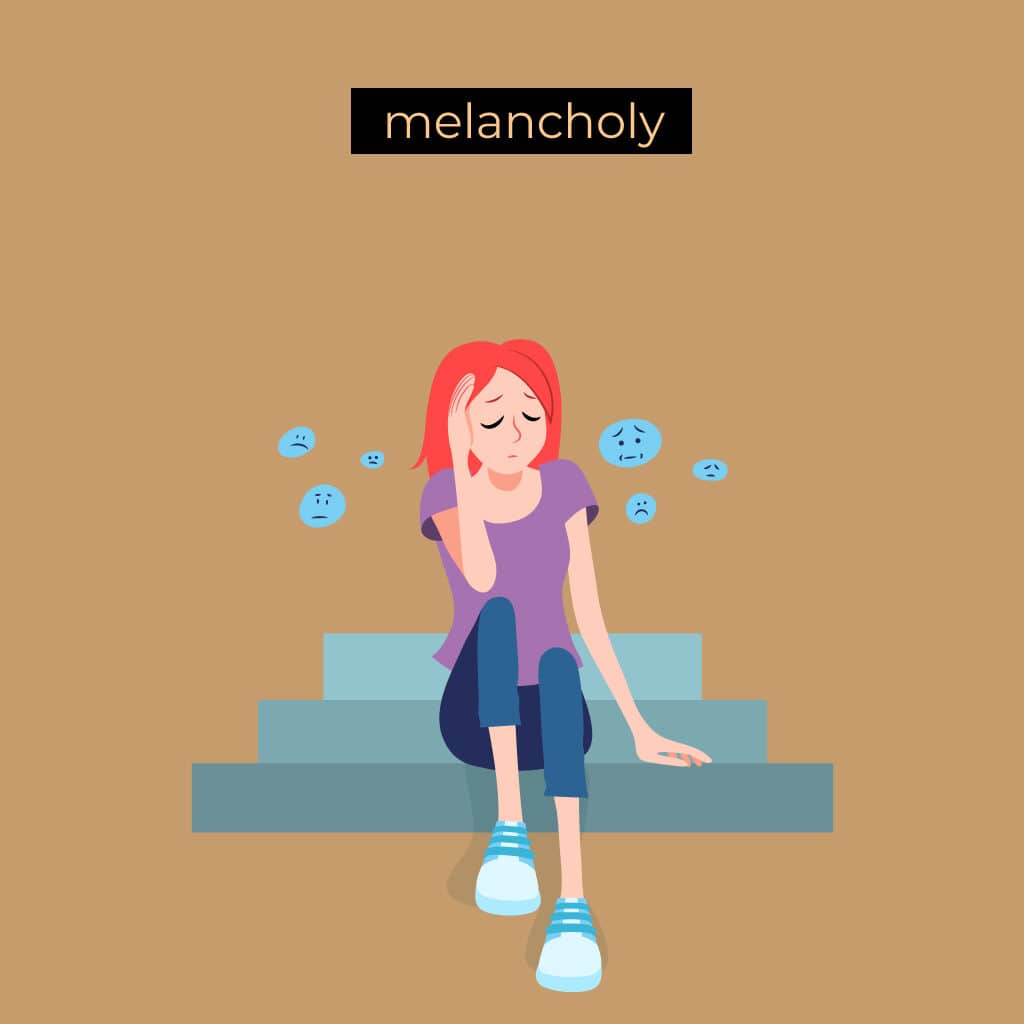
GRE Newsletter Subscribe
Enter your email address below and subscribe to our newsletter

Enter your email address below and subscribe to our newsletter

Hello folks, welcome to the 17th GRE Word List Blog. This series of blogs aims to provide GRE aspirants with a comprehensive set of GRE Word Lists to bolster their GRE Verbal Preparation.
If you haven’t read our previous blogs, check them out here – GRE Word List Blogs Home Page
‘Recalcitrant is a word I’ve been wanting to blog about for a while. Finally, I delved into its word origins and discovered that it originates from ‘heels/kicking out’ and being difficult, in general. So, that led me to scour for words that also had their origins in human body parts. And that’s how I got the overall theme for this blog.
This week’s words are visceral, dishevelled, supercilious, melancholy, capricious and recalcitrant.
Part of Speech – adjective
Definitions –
1. relating to deep inward feelings rather than to the intellect.
2. relating to the viscera, primarily abdominal internal organs.
Word Origins – from French viscéral and directly from Medieval Latin visceralis “internal,” from Latin viscera.
Synonyms – instinctive, innate.
Usage – When he couldn’t decide between 2 options, he relied on his visceral instincts and chose one.
As unlikely as it sounds, our gut is connected to our brain – physically, and biochemically. The vagus nerve is one of the biggest nerves in our body, and connects the gut and brain, among other parts.
An interesting study found that feeding mice a probiotic reduced the amount of stress hormone in their blood. However, when their vagus nerve was cut, the probiotic had no effect.
We experience a weird sensation in our gut when we’re in an uncertain situation / interacting with suspicious/potentially dangerous individuals, and a flush of relief when a high-stakes situation is defused/resolved to our favour. This is gut instinct.
In a fight-or-flight situation, our body releases adrenaline, and the blood flow to our stomach reduces. This gives us a sensation of ‘butterflies in our stomach.’
Let the butterflies flutter by.
Part of Speech – adjective
Definition – (of a person’s hair, clothes, or appearance) untidy; disordered.
Word Origins – late Middle English: from obsolete dishevely, from Old French deschevele, (based on chevel ‘hair’, from Latin capillus )
Synonyms – untidy, messy.
Usage – She woke up and began combing her disheveled hair.

Dandruff is a common scalp condition that causes dry, dead skin to flake off the scalp and makes your scalp itchy. Often the cause of dandruff is attributed to anything but the actual cause – Malassezia, a type of yeast.
Most people have Malassezia that feasts on the sebum in their scalps. However, only in some people, this feasting results in the production of dandruff.
Here’s a Ted-Ed video that explains this phenom. in a lot more detail.
Part of Speech – adjective
Definition – behaving or looking as though one thinks one is superior to others.
Word Origins – early 16th century: from Latin superciliosus ‘haughty’, from supercilium ‘eyebrow’.
Synonyms – arrogant, haughty, pompous.
Usage – His supercilious attitude put the interviewer off.
Part of Speech – noun/adjective
Definition –
1. a feeling of pensive sadness, typically with no obvious cause.
2. having a feeling of melancholy; sad and pensive.
Word Origins – Middle English: from Old French melancolie, via late Latin from Greek melankholia, from melas, melan- ‘black’ + kholē ‘bile’
Synonyms – desolation, lugubrious, mournful.
Usage – She was in a state of melancholy over her latest GRE mock score.

Man, Kirsten Dunst has to be one of the unluckiest actresses, in terms of the characters she plays. After abandoning Leonardo DiCaprio in the literal wake of a tragedy, she is apparently now left with crippling depression.
In Lars Von Trier’s masterpiece, ‘Melancholia,’ Dunst plays a depressed woman, trapped in a marriage against her choice. Over the course of the movie, she struggles with her work, her marriage, and life in general, as a result of her melancholia.
The movie was inspired by one of Von Trier’s therapy sessions where his therapist told him that depressed people act calmer in the face of tragedy because they already expect the worst to happen. As a result, Dunst placidly meditates as the movie ends in catastrophe.
This movie is critically acclaimed, with Dunst receiving the Best Actress award at Cannes.
Contrary to its name, the movie is visually stunning, and you’ll be better off having watched it.
Part of Speech – adjective
Definition – given to sudden and unaccountable changes of mood or behaviour.
Word Origins – early 17th century: from French capricieux, in turn from Italian capriccio, ‘a sudden start’ (influenced by capra ‘goat’, associated with frisky movement), from capo ‘head’ + riccio ‘hedgehog’
Synonyms – fickle, mercurial, vacillating.
Usage – Her capricious nature meant that she was given to sudden bouts of indecision.
Hedgehogs get their names from the fact that they frequent hedgerows (areas surrounding fields and trees, often in and around shrubs) and they possess snouts similar to pigs. They are, however, different from porcupines.
Porcupines are rodents and have quills that can easily release, and lodge in predators. Hedgehogs, on the other hand, cannot release quills. They can merely roll themselves into balls, causing them to be extremely difficult/uncomfortable to eat/kill.
Sonic, the famous video game (and now movie) character is a hedgehog and is capable of reaching supersonic speeds, true to his name. Sonic, SEGA’s mascot was and is so culturally relevant, he had a class of genes named after him.
Finally, hedgehogs (and porcupines) also contributed to sociopsychological studies. The hedgehog’s dilemma describes a situation in which a group of hedgehogs seek to move close to one another to share heat during cold weather. They must remain apart, however, as they inadvertently hurt each other with their sharp spines. Though they all share the intention of a close reciprocal relationship, this seldom occurs, for reasons they cannot avoid.
Similarly, in human intimacy contexts, despite goodwill, human intimacy cannot occur without substantial mutual harm, and what results is cautious behaviour and weak relationships. This dilemma is also used to partly explain introversion.
To hedge or not to hedge…
Part of Speech – noun/adjective
Definition – having an obstinately uncooperative attitude towards authority or discipline.
Word Origins – mid 19th century: from Latin recalcitrant- ‘kicking out with the heels’, from the verb recalcitrare, based on calx, calc- ‘heel’.
Synonyms – uncooperative, intractable, defiant.
Usage – The Brat Pack often got in trouble with their teachers because of their recalcitrant nature.
A wonderful film that everyone should watch at least once, The Breakfast Club explores the lives of teenagers from various cliques in life. The characters in the movie are who they are as a result of their upbringing, their environment and their inability to overcome their relationship with their parents.
The film follows them as they spend a whole day in detention, each brought there because of misadventures of various degrees (one of them is there voluntarily), open up about their problems and are influenced and changed by their peers.
In the end, The Brat Pack leaves detention with a triumphant declaration in which they state who they are, but also reprimand society (indirectly) for labelling them on their most prominent attribute.
They sign off the essay they’d been writing with, “Sincerely yours, the Breakfast Club.”
Chills.
Did you like this GRE Word List Blog? Let us know what you’d like us to write about next, in the comments below!
Watch this video for more!
Wizako’s Online GRE Prep Quant Course can help.
Check it out, and sign up for a free trial now!
We at Wizako have launched our Application Assistance services, and are eager to work with MBA & Grad School Aspirants who are looking to study abroad. Write to us at [email protected] to get a free profile evaluation, and for more information on our services.
Check us out on our Social Media Handles!